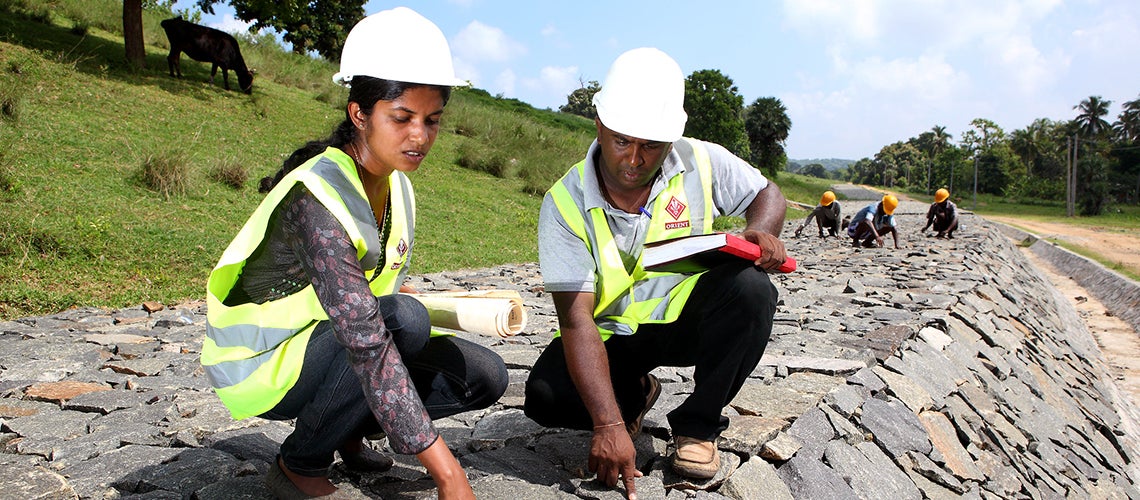 Photo: Lakshman Nadaraja/World Bank
Photo: Lakshman Nadaraja/World Bank
Developing countries are at a critical crossroads. They are facing multiple, overlapping, and compounding crises from the lingering COVID-19 pandemic, growing impacts of climate change, economic imbalances and rising debt distress , commodity price shocks and food insecurity, and persistent fragility and conflict—with the war in Ukraine currently exacerbating many deteriorating trends. These shocks have had both a deep direct human and economic impact as well as long-term adverse spillovers on developing countries, threatening to reverse decades of development gains.
For development institutions, these challenges call for an urgent and wide-ranging response. The World Bank Group (WBG) is responding with impact, scale and speed, with a 15-month crisis response of around $170 billion to help countries to address multiple overlapping crises , including up to $30 billion to address the ongoing global food crisis. This follows the WBG’s pandemic surge, its largest crisis response in history, bringing some $200 billion between April 2020 and March 2022 to help countries fight the health, economic, and social impacts of the pandemic, while also maintaining a focus on the climate agenda.
The Bank is building on decades of experience in mounting this comprehensive response. The speed, scale, flexibility, and innovation in tackling these multiple crises is grounded in deep expertise and strong country dialogues in critical areas, such as crisis response, disaster risk reduction, reconstruction, strengthening institutions (particularly in fragile settings), and integrating climate considerations into development planning and implementation. While addressing the immediate devastation wrought by war, COVID, and climate change, the Bank has kept its focus on protecting the poor and vulnerable, boosting the response capacity of developing countries , and also laying the groundwork for countries to achieve a green, resilient and inclusive development (GRID) over the long term.
Measuring progress towards these goals requires tracking the Bank’s contribution in helping countries improve people’s well-being—for example, their health, human capital, security, opportunity, and standard of living. This means strengthening the Bank’s results system both to monitor progress towards long-term results and to measure the contribution of its immediate crisis response. This outcome orientation aims for a clear line of sight to high-level outcomes (HLOs) that are rooted in a country’s national development goals and aligned with the World Bank’s twin goals and the Sustainable Development Goals (SDGs). HLOs result from multiple activities over long periods of time, using lending and non-lending instruments, coordinating among the WBG institutions, and convening partnerships effectively.
Given the complex challenges countries are facing, results systems that assume incremental linear progress towards pre-established output targets have limited relevance. Today, it is important instead to show how the Bank is helping countries to change course in the light of changing circumstances, to limit development setbacks while protecting and expanding the foundations that will support a greener, more resilient, and more inclusive future. It is the Bank’s ability to focus country policies, systems and institutions on delivering compounding longer-term benefits over time that will make the difference.
The Bank’s country-based model is a defining element of the way the World Bank aims for outcomes. Our Country Partnership Frameworks (CPFs) aim to ensure that project results frameworks embed measurable indicators that can be linked back to CPF objectives. Our data collection mechanisms as well as strong results stories that capture longer-term progress are building a rich narrative that shows how the Bank is contributing to lasting improvements in the lives of the poorest. Taking a long-term view is particularly important in countries experiencing fragility, conflict, and violence (FCV), where circumstances change quickly, and short-term results reporting fails to capture hard-earned gains achieved over long cycles of advance and decline. An outcome-oriented approach takes a dynamic view of results measurement systems and indicators, building in flexibility and accounting for the greater risk in this more volatile environment.
Now, more than ever before, we need to build results systems that help us leverage knowledge and evidence from our operations in real time, from all sources, including the World Bank Group’s highly regarded Independent Evaluation Group (IEG). The Bank produces an annual written record of how IEG evaluations translate into concrete actions and lead to meaningful outcomes. This notes, for example, the Bank’s enhanced approach to citizen engagement, including through an IDA19 policy commitment, because of IEG analysis. This has led to an expansion of the Citizen Engagement platform in Mongolia and a pilot social accountability program in Zambia, among other things.
As fiscal constraints become more binding around the world, the Bank needs to continue showing shareholders and taxpayers how their resources are helping people in the developing world build a better future. Corporate results frameworks like the Corporate Scorecards and the IDA Results Measurement System (RMS), which will track progress in implementing the $93 billion IDA20 replenishment package, are being strengthened to better articulate the value of our support. The IDA20 RMS has been revamped by providing a stronger linkage of IDA operations from inputs to outputs and intermediate to longer-term outcomes. The Corporate Scorecard and a new Results Yearbook tell a more accessible story of how Bank resources are achieving lasting results.
Of course, the Bank achieves its most impressive outcomes only when its works closely with other development partners, and when our partnerships have a collective focus on targeting and measuring the same results, in the same ways. As the Bank chairs a two-day meeting of the Managing Development Results (MfDR) Working Group—a group that brings together all multilateral development banks (MDBs) to reflect on the results agenda—we have put outcome orientation at the core of our leadership effort to improve lives and livelihoods around the world.


Join the Conversation